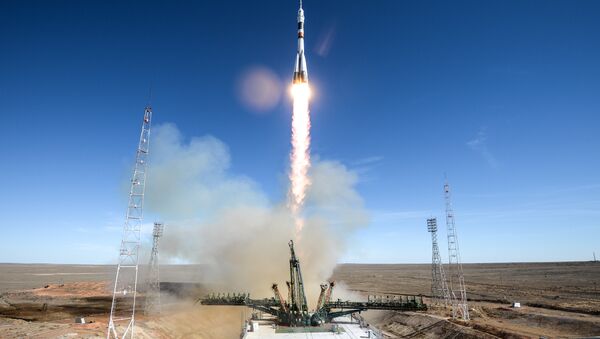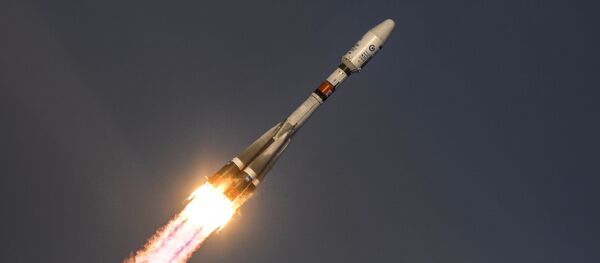"The Soyuz-FG rocket designed for the launch of Progress MS-10 has been already assembled into a stack [the first and second stages of the rocket] at the Baikonur [cosmodrome]… A considerable number of checks have already been made. All works with the rocket have been suspended and not because launches have been forbidden — it is not prohibited to make preparations after all — but because it may have the same defects as the rocket that malfunctioned and it could help the investigation," the source said.
READ MORE: Impossible to Draw Conclusions on Soyuz Booster Failure Cause Now — Kremlin
The Progress MS-10 cargo spacecraft is still being prepared for the launch to the International Space Station (ISS) in November after the failed liftoff of Soyuz MS-10, however, the stowage of cargo has been suspended, a source in the space industry told Sputnik on Saturday.
"The experts of the RSC Enegiya are preparing the cargo for the launch to the ISS, however they stopped loading them on the spacecraft because it is obvious that they will have to stow it all over again: some of the equipment will not be needed at the station any more and some things will be required to be urgently delivered by the Progress to the station," the source said.
According to the source, the suspended launches of the Soyuz-FG boosters do not affect the preparations for the spacecraft's launch because it takes two months to prepare a cargo spacecraft for the flight and it requires only two weeks to prepare a launch vehicle.
"They will continue to prepare the spacecraft and if the ban on launches has not been lifted by the moment [the spacecraft] has to be filled up with fuel, it will be put into a storage mode and they will wait for the permission for the launch," the source added.
"The found fragments of the launch vehicle, which may be of interest to the members of the emergency commission and the investigation, have been put on flatbed trucks, and the convoy with the wreckage of the rocket has already left Zhezqazghan for Baikonur. In the middle of the night, the convoy is expected to arrive at the cosmodrome," the source said.
It is planned that a cargo plane will arrive from Samara to Baikonur on Sunday. The fragments of the rocket will then be loaded into the plane and transported to Samara for examination.
The launch of the Progress MS-10 cargo spacecraft to the International Space Station (ISS) was scheduled to take place on October 31, however, the launch was postponed to November following the failed liftoff of the Soyuz MS-10 on Thursday that used the same booster.
An accident occurred during the liftoff of a Soyuz-FG launch vehicle carrying the Soyuz MS-10 spacecraft with two new members of the International Space Station (ISS) crew on board — Russian cosmonaut Alexey Ovchinin and NASA astronaut Nick Hague.





